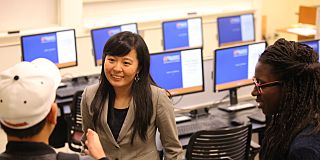This course is first in a two-seminar sequence that introduces students to the science and business of the biotechnology industry. The course explores cutting-edge translational research that is shaping current commercialization and industry trends. Students engage directly with primary research literature and learn from leading scientists and industry executives. Example topics include AI, gene editing/therapy, precision medicine, tissue engineering, biomanufacturing, and synthetic biology.
M.S. in Commerce | Academics
Biotechnology Track
The 21st century is poised to be an era of unprecedented productivity and innovation in life sciences. In particular, biotechnology will define the coming decades, just as information technology has been a dominant force in shaping modern life today. As the global pandemic has shown, such innovation has the potential to be transformative—addressing key health, medical, and humanitarian challenges around the world. However, maximizing opportunities for novel scientific discoveries and responding to global challenges will require skilled and versatile professionals who understand both the science of biotechnology and the business of commercialization.
Designed for life science majors who are interested in solving complex societal challenges, McIntire's M.S. in Commerce Biotechnology Track will prepare you for a career at the intersection of science, business, and society.
-
Understand how to successfully commercialize breakthrough life science technologies that have high potential to generate social and economic value
-
Deeply engage with primary scientific literature that generates biotechnology innovations
-
Develop commercialization plans and learn how to assess operating models and regulatory pathways
-
Learn from leading scientists, faculty, and industry executives
-
Prepare to successfully contribute to organizations seeking to positively impact human health and well-being
Biotechnology Track Course Descriptions
Students will take 6 credits of required courses (GCOM 7290 and 7291) and 9 credits of electives (3 credits of a Data Analytics course, 3 credits of a Science elective, and 3 credits of a Value Creation elective).
GCOM 7290: Frontiers in Biotechnology I (3 credits)
GCOM 7291: Frontiers in Biotechnology II (3 credits)
This course is second in a two-seminar sequence that introduces students to the science and business of the biotechnology industry. In addition to continued exploration of translational research, this course focuses on deeper scientific and commercialization topics specific to the industry, including operational and financial perspectives across all stages of organizational maturity. Students learn from industry leaders who are commercializing, analyzing, and investing in biotechnology.
Sciences Elective
3 credits; select from University of Virginia BME, CHE, or PHS graduate classes of 5000 level or higher; must be chosen in conjunction with the Biotechnology Academic Director
Data Analytics Electives
3 credits chosen from the list below:
GCOM 7140: Customer Analytics (3 credits)
This research-oriented class examines how firms can leverage customer analytics to successfully create, manage, and grow brands. The class provides marketing managers and operational business leaders with the analytical tools to develop and operationally execute brand strategies that enhance customer engagement and loyalty.
GCOM 7210: Predictive Analytics with Low Code Technology (3 credits)
Business analytics leverages the vast data resources available today to identify trends and patterns that are critical to enhancing business performance. This course introduces students to contemporary business analytics methods, including predictive and descriptive analytics techniques, and demonstrates how to practically apply analytics to real-world business decisions.
GCOM 7214: Managerial View of AI (3 credits)
This course aims to provide students with a practical understanding of artificial intelligence technology. It covers key factors for the successful development, deployment, and management of AI, machine learning, and other algorithmic approaches to automated decision-making. Students will better understand the societal impacts of AI, ethical considerations in the use of AI, the limitations of AI, and approaches to balance AI risks and benefits.
GCOM 7240: Advanced Quantitative Analysis (3 credits)
This course provides multivariate statistics training to analyze big data sets. It covers discrete choice modeling (logistic and probit models), classification techniques (discriminant and cluster analyses), data reduction techniques (factor analysis), and advanced predictive techniques (regression models with interactions and curvilinear effects, structural equation modeling, and factorial ANOVA). Students are trained on IBM-SPSS, SAS, and R.
GCOM 7260: Unstructured Data Analytics (3 credits)
This course is focused on harnessing the power of unstructured data to perform advanced analytical techniques. Students will be exposed to big data technologies (NoSQL, Hadoop, etc.) to understand how to manage and interact with large, complex data sets. Various analytical and machine learning techniques that can apply to these data, with particular attention to text data from reports, articles, and social media, are covered.
Value Creation Electives
3 credits chosen from the list below:
GCOM 7252: Consulting (1.5 credits)
This course is designed to provide a broad overview of management consulting and other related advisory services professions while also helping students develop skills that are broadly applicable in these professions as well as in other fields (business, politics, not-for-profit, etc.). Working both individually and in teams, students will gain an appreciation of what makes consulting and advisory services unique from other areas of business.
GCOM 7292: Entrepreneurship (1.5 credits)
This course focuses on how to successfully commercialize breakthrough technologies that have high potential to generate social and/or economic value. Issues related to identifying market needs and potential, developing commercialization plans, and understanding business models and entrepreneurial strategy are covered. As an introduction, this is not an appropriate course for students who minored in or have a strong foundation in entrepreneurship.
GCOM 7730: Mergers & Acquisitions, Private Equity, & Restructuring (3 credits)
This course explores three main topics: (1) mergers and acquisitions, (2) non-distressed corporate restructurings in the form of leveraged buyouts and private equity, and (3) distressed corporate restructuring/bankruptcy. The largely case-based course extends concepts and principles learned in GCOM 7060 and GCOM 7710 to practical applications. Students will also participate in two negotiation exercises during the term.
PHS 7090: Health Care Economics (3 credits)
This course reviews principles of economics most relevant to analyzing changes in healthcare provision and applies those principles to current healthcare institutions and their performance, trends in healthcare service delivery, and methods of forecasting future trends. Prerequisite: Graduate standing in the PHS program or instructor permission
Disclosure: The information contained on this website is for informational purposes only. The Undergraduate Record and Graduate Record represent the official repository for academic program requirements.


